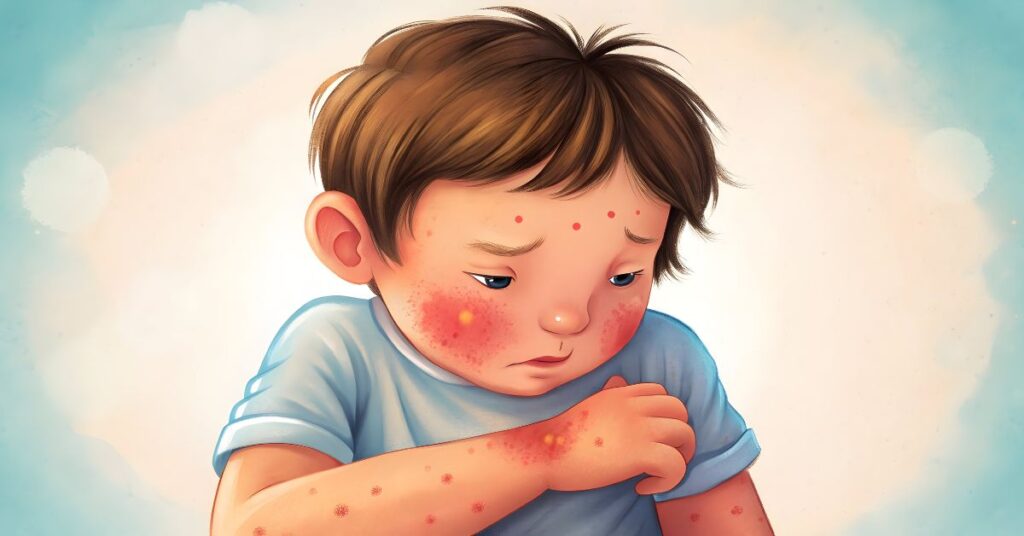Summer is often a season of enjoyment and outdoor activities for people, but with a number of peculiar health concerns – the very damages to skin if experienced by infants – the same will affect infants with weakly formed immune systems, as the environment itself can be a triggering factor. During very hot weather, in the protection of the skin, the major problems are heat rashes and summer allergies, both of which cause discomfort and distress to infants and their carers.
This guide is meant to help parents and carers of children develop an understanding of the two conditions, of their symptoms as early as possible, and finally of their prevention and care so that the summer months can turn truly enjoyable for their babies.
Understanding Heat Rashes in Infants
Heat rash, or heat prickles, is a skin condition anywhere from rather mild to severe. It is a reaction of the skin in response to excessive heat and sweat. Sweat glands get blocked for certain reasons, and swelling occurs underneath the skin due to the entrapped sweat. This leads to the formation of little red bumps and blisters, mostly on the areas where sweat collects or where clothing causes friction with skin.
Causes and Risk Factors
- Excessive sweating due to hot and humid weather
- Wearing tight or non-breathable clothing
- Over-bundling infants with too many clothes or blankets
- Prolonged exposure to warm environments without adequate ventilation
Common Areas Affected
- Neck
- Back
- Chest
- Armpits
- Diaper area
- Skin folds (e.g., behind knees, inside elbows)
Signs and Symptoms
- Tiny red or pink bumps, sometimes resembling blisters
- Mild itching or prickly sensations, often leading to fussiness
- Tenderness or irritation in affected areas
- Possible mild swelling
Heat rashes are generally harmless and tend to resolve with appropriate care. However, persistent scratching or untreated rash can lead to secondary bacterial infections.
Understanding Summer Allergies in Infants
Summer allergies are caused by the infant’s immune system reacting to airborne allergens prevalent during warmer months, such as pollen, dust mites, mould spores, and pet dander. Unlike heat rashes, these allergic reactions involve systemic responses that can affect the respiratory system, skin, and eyes.
Common Triggers
- Tree, grass, and weed pollen
- Mold spores thriving in damp environments
- Indoor allergens such as dust mites
- Outdoor pollutants and smoke
Signs and Symptoms
- Sneezing and nasal congestion
- Runny nose or post-nasal drip
- Watery, itchy, or red eyes
- Skin manifestations such as rashes or hives
- Coughing or mild wheezing
- Difficulty sleeping due to congestion or discomfort
Infants may not be able to communicate their discomfort clearly, so observing changes in behavior—such as increased irritability or feeding difficulties—is crucial.
Preventive Measures for Heat Rashes
Effective prevention of heat rashes centers on reducing sweating and keeping the infant’s skin cool and dry.
1. Dress Appropriately
Choose lightweight, loose-fitting clothing made from breathable fabrics like cotton to allow air circulation and minimize sweating.
2. Maintain a Cool Environment
Use fans or air conditioning to keep indoor temperatures comfortable. Avoid excessive bundling, even at night.
3. Practice Regular Hygiene
Give the infant frequent baths with lukewarm water to wash away sweat and soothe the skin. Ensure skin folds and areas prone to moisture are gently dried afterward.
4. Change Damp Clothing Promptly
Replace wet or sweaty clothes with dry ones as soon as possible to prevent moisture accumulation.
5. Avoid Heavy Creams or Ointments
Avoid using thick creams or oils that can clog pores and exacerbate sweating unless prescribed by a healthcare professional.
Preventive Measures for Summer Allergies
Reducing exposure to allergens is key to preventing allergic reactions.
1. Monitor Allergen Levels
Stay informed about daily pollen counts and avoid outdoor activities during peak pollen times, typically early morning and late afternoon.
2. Maintain Indoor Cleanliness
Keep living spaces clean and dust-free. Use HEPA filters and air purifiers to reduce airborne allergens.
3. Regular Cleaning of Baby’s Environment
Wash bedding, toys, and clothes regularly in hot water to eliminate dust mites and pollen residues.
4. Limit Pet Exposure
If pets are present, maintain their hygiene and restrict their access to the infant’s sleeping area.
5. Keep Windows Closed During High Pollen Days
Prevent allergens from entering the home by keeping windows and doors closed during high pollen seasons.
When to Seek Medical Attention
While most cases of heat rash and mild allergic reactions can be managed with home care, certain signs warrant prompt medical consultation:
- Rash accompanied by fever or signs of infection (pus, swelling, warmth).
- Persistent or worsening symptoms despite home care.
- Severe allergic reactions such as difficulty breathing, persistent coughing, or swelling of the face and lips.
- Signs of dehydration, including dry mouth, lethargy, or reduced urination.
- Poor feeding or inability to sleep due to discomfort.
Consulting a pediatrician can ensure accurate diagnosis and appropriate treatment, which may include topical medications, antihistamines, or further allergy testing.
Conclusion
With heat rashes and summer allergies being two of the common childhood diseases, children should enjoy a healthy summer, along with respect to care, awareness, and timely intervention. By using healthy ways, such as dressing the baby appropriately, keeping a cool environment, reducing allergens, and nurturing close observation of your infant’s symptoms, you will ensure that it will be a safe, comfortable summer for your child.
If you are ever concerned about the skin or allergic symptoms affecting your infant, seek help and consultation from an expert pediatrician for proper guidance and treatment. Pediatric Newborn Clinic in Greater Noida West is committed to providing expert pediatric care customized to the needs of your child. Contact us today for consultation and guidance on keeping your infant healthy all year round.



